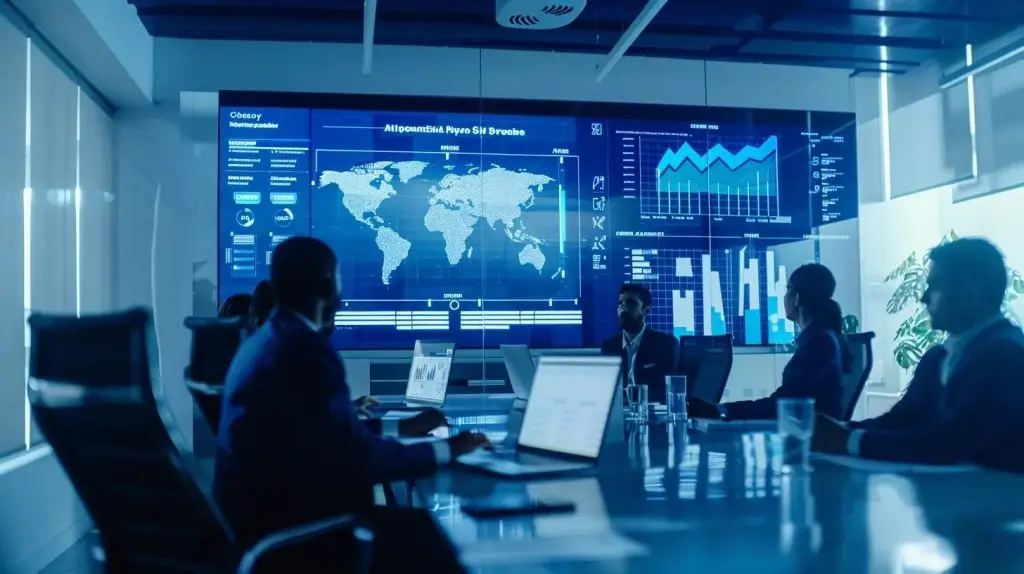Ensuring Digital Safety With Leading Cyber Security Firms in Australia
A Guide to Australia's Leading Cyber Security Firms: Ensuring Your Digital Safety
In an era of rapidly evolving cyber threats, Australian businesses, government agencies, and enterprises must prioritize the protection of their digital infrastructure. Data breaches and cyberattacks compromise confidential information, disrupt operations, and damage consumer trust. This guide explores how to identify top cyber security firms, understand their service offerings, evaluate expertise, compare pricing structures, assess reputation, and schedule consultations based on your needs. With a focus on compliance-driven solutions like ISO27001, ASD Essential 8, and risk management, decision makers can find a trusted partner to safeguard their digital assets while supporting digital transformation.
Understanding data safety is essential in a landscape marked by innovations in cloud computing, managed detection and response, endpoint protection, and advanced threatintelligence. Selecting an experienced cyber security firm is necessary to protect critical infrastructure, sensitive intellectual property, and customer data. The following sections break down key considerations for matching your unique risk profile with the best local service providers.
Identify Top Cyber Security Firms to Protect Your Data Safety
Choosing the right partner is the first step in building a resilient digital defense. Top firms combine technical expertise with proactive management to stay ahead of evolving threats. Key factors include local specialization, customer reviews, certifications, service comparisons, rapid response times, and transparent pricing.
Australian firms must understand the regional threatlandscape and regulatory frameworks. Look for firms experienced in serving industries such as government, healthcare, and finance. Begin by researching companies through their websites, industry awards, and media coverage to identify those that have successfully supported businesses similar in size and scope.
Research Local Firms Specializing in Cyber Security Services
Local firms offer valuable expertise in regional cyber threats and compliance requirements. They typically provide threat detection, incident response, and solutions for critical infrastructure, financial services, and healthcare. Research involves checking accredited directories, third-party reviews, and case studies. Endorsements from sources like the Australian Cyber Security Centre or inclusion in the Magic Quadrant indicate strong local knowledge and up-to-date practices.
Evaluate Reviews and Testimonials From Past Clients
Client reviews and testimonials offer real-world insights into a firm’s performance. Look for detailed case studies, client interviews, and independent reviews that describe how the firm addresses cyber incidents and manages risks. Positive testimonials often highlight prompt breach resolution, effective risk management, and strong customer support, all of which add to a firm’s overall credibility.
Check Certifications and Industry Recognition for Credibility
Certifications such as ISO27001, SOC 2, and adherence to the ASD Essential 8 are key indicators of a firm’s security posture. These credentials show that a firm follows strict guidelines and routinely audits its processes. Industry awards and rankings further validate a firm’s effectiveness. Verify that certifications are recent and relevant—especially for firms focused on cloud security and advanced threat detection.
Compare Service Offerings of Various Firms in Australia
Examine the range of services offered, from vulnerability assessments and penetration testing to continuous monitoring and incident response. Some firms additionally offer compliance training, AI-driven threat detection, and cloud security advisory services. Ensure the service suite aligns with your needs; for instance, consider firms that provide specialized solutions such as endpoint detection and response (EDR), managed detection and response (MDR), or extended detection and response (XDR).
Assess Response Times and Support Availability
Rapid response is critical in cyber security. A firm’s ability to quickly detect and mitigate incidents can minimize damage. Look for firms with clear service level agreements (SLAs) detailing emergency response times and 24/7 support. Real-world case studies demonstrating swift incident containment and effective communication are strong indicators of a firm’s capability.
Analyze Pricing Structures and Contract Terms Clearly
Cost is important, but the lowest price may not provide the best protection. Transparent pricing should detail all costs, including base fees, hidden charges, and fees for emergency support. Compare fixed monthly retainers, tiered packages, and pay-per-incident options. Ensure the chosen package aligns with your risk exposure and operational budget without compromising quality.
Understand the Services Offered by Cyber Security Experts
Cyber security experts deliver a range of services that safeguard digital assets and ensure compliance. Their offerings affect your overall security posture and include malware protection, network assessments, incident response, employee training, cloud security solutions, and ongoing threat monitoring.
Modern cyber security extends beyond firewall management. It requires a multifaceted approach to secure endpoints, networks, and cloud-stored data. Experts also help identify vulnerabilities, assess business risks, and develop strategies to mitigate potential threats.

Learn About Malware Protection and Prevention Strategies
Malware protection defends systems against viruses, ransomware, spyware, and other malicious software. Firms use antivirus software, intrusion detection systems, and behavior-based analytics to promptly detect and isolate threats. Advanced malware solutions often leverage machine learning to adapt to new threat patterns, ensuring early detection and containment before an incident escalates.
Review Network Security Assessments and Audits
Regular network assessments and audits are essential for identifying vulnerabilities. Cyber security experts employ vulnerability scanners, penetration tests, and configuration reviews to gauge the security posture and identify remedial measures. These audits support policy updates, patch management, and compliance with regulatory frameworks, thereby enhancing overall network resilience.
Discover Incident Response and Recovery Planning
No system is entirely immune to cyber threats, so effective incident response and recovery planning are vital. Experts develop comprehensive plans with immediate breach containment, thorough investigations, and clear communication protocols. A strong incident response plan minimizes downtime, limits financial losses, and provides valuable lessons for future improvements, ensuring continuous resilience.
Explore Training Programs for Employee Cyber Safety
Since human error is a major vulnerability, robust training programs are essential. Effective programs educate employees on phishing awareness, secure password practices, and safe internet usage. Tailored simulations, workshops, and ongoing certifications help reinforce a culture of security and drastically reduce the overall risk profile.
Investigate Cloud Security Solutions and Best Practices
As businesses move to cloud-based infrastructures, robust cloud security becomes critical. Specialized solutions protect data on virtual servers, secure multi-cloud environments, and manage remote access controls. Best practices include robust encryption, secure APIs, and continuous monitoring. These solutions ensure that cloud deployments comply with standards like ISO27001 while reducing the risk of breaches and data loss.
Find Out About Ongoing Monitoring and Threat Detection
Continuous monitoring is a cornerstone of proactive cyber security. Advanced systems collect and analyze data across your digital infrastructure to detect anomalies in real time. Tools such as Security Information and Event Management (SIEM) systems and Extended Detection and Response (XDR) platforms use sophisticated algorithms to identify emerging threats and ensure rapid response, keeping your defenses current against evolving risks.
Evaluate the Experience and Expertise of Security Firms
Choosing a partner requires a thorough evaluation of their experience and expertise. The most effective firms have long-standing industry experience, a highly qualified team, proven case studies, strategic partnerships, and deep regulatory knowledge.
Look Into the Years of Operation in the Industry
A firm’s longevity is a key indicator of reliability. Firms that have navigated numerous cyber incidents demonstrate operational maturity. Their evolving service offerings—often incorporating new technologies like artificial intelligence and cloud security—highlight their commitment to innovation and continuous improvement.
Assess the Qualifications of the Team Members
Expertise is often reflected in a team’s qualifications. Look for advanced certifications (e.g., CISSP, CEH, CISM), strong educational backgrounds, industry awards, and active participation in cyber security forums. A multidisciplinary team covering network defense, digital forensics, risk management, and compliance is best equipped to address your diverse security needs.
Examine Case Studies Showcasing Successful Outcomes
Case studies provide practical evidence of success. Look for examples that detail client challenges, the solutions implemented, and measurable outcomes such as reduced breach rates or improved compliance scores. These cases demonstrate technical skill, flexibility, and effective risk management in real-world scenarios.
Check for Partnerships With Reputable Technology Providers
Strategic partnerships with well-known technology vendors such as Palo Alto Networks, Fortinet, Sophos, and Trend Micro indicate strong market recognition and access to cutting-edge tools. These relationships reinforce the firm’s capability in threat detection, risk assessment, and comprehensive security management.
Consider Their Expertise in Compliance Regulations
Firm expertise in regulatory matters is crucial. Look for deep experience with compliance standards such as NIST, PCI DSS, and ISO. Firms that provide audit support and compliance training demonstrate their readiness to help organizations navigate complex legal and regulatory landscapes while maintaining data security.
Understand the Firm’s Approach to Risk Management
Effective risk management is integral to any cyber security strategy. Top firms integrate this process into every service aspect—from vulnerability assessments to post-incident recovery. Their methodology should clearly identify potential threats, quantify risks, and outline tailored mitigation strategies that support business continuity and digital transformation.
Compare Cyber Security Firms Based on Pricing and Packages
Price comparison is essential, but it must be balanced with value. Review pricing models and service tiers to understand what is included in each package. Options may include fixed monthly retainers, usage-based pricing, or tiered services that adjust to your risk profile. Ensure that the cost aligns with comprehensive threat detection, incident response, and ongoing support without hidden fees.

Review Pricing Models and Service Level Agreements
A transparent pricing structure details all costs—from basic monitoring to incident response and training. Request a cost breakdown and compare it to industry benchmarks. This practice ensures that you receive competitive and complete service under clearly defined contractual terms.
Analyze the Value Included in Different Service Tiers
Service tiers vary in scope. Lower-tier packages may offer network monitoring and antivirus protection, while higher-tier solutions can include digital forensics, regulatory assistance, and continuous risk assessment. Choose a package that matches your enterprise size and risk exposure—for instance, a mid-tier solution might suffice for moderate risk, whereas highly regulated industries may need premium packages.
Consider Potential Additional Costs and Hidden Fees
Be aware of extra charges that can arise during emergencies, such as fees for rapid incident response or forensic investigations. Verify all potential costs and negotiate clear contract terms, including customization fees, to prevent unexpected expenditures.
Investigate the Possibility of Customized Service Packages
Since every organization’s risk profile is unique, many firms offer customizable packages. These can include tailored response times, specialized tool integrations, or advanced threatintelligence modules. A customized package ensures that you pay only for the necessary services while maintaining robust protection against cyber threats.
Look for Firms Offering Consultation Sessions
Initial consultation sessions are valuable for assessing a firm’s fit with your needs. Many companies provide free or introductory consultations that include risk assessments or preliminary audits. Use these sessions to understand the firm’s methodology, pricing models, and communication style before making a decision.
Evaluate Budget-Friendly Options Without Compromising Quality
For organizations with budget constraints, finding an affordable yet effective solution is key. Look for firms that offer flexible, scalable services without sacrificing protection quality. Compare performance metrics and case studies to ensure that cost-effective options still meet industry standards.
Check the Reputation and Trustworthiness of Each Firm
A strong reputation and documented trustworthiness are essential. Evaluate a firm’s history, client feedback, and regulatory compliance to ensure a secure, long-term partnership.
Investigate Ratings on Industry Review Platforms
Independent review sites and rating platforms can provide impartial assessments. Look for firms with consistently high ratings and positive client feedback regarding reliability, incident response, and overall service quality.
Consult With Peers or Business Networks for Recommendations
Peer recommendations in industry forums or business networks offer firsthand insights into a firm’s performance. Testimonials and referrals from similar organizations can help reveal strengths and potential issues not evident in online reviews.
Look for Complaints Filed With Consumer Protection Agencies
Review any complaints or regulatory findings related to the firm. A history of resolved disputes, transparent communications, and proactive issue management is a positive indicator of trustworthiness.
Verify the Firm's History of Handling Cyber Incidents
Examine documented incident reports and case studies to see how the firm has managed previous cyberattacks. A consistent record of timely, transparent responses and improvements after incidents is a strong sign of capability.
Assess Transparency in Communications and Dealings
Trustworthy firms provide clear documentation, regular performance reports, and honest post-incident assessments. Evaluate if the firm communicates expectations, challenges, and improvements effectively.
Look for Compliance With Data Protection Regulations
Ensure the firm complies with regulations such as the Australian Privacy Principles, HIPAA, and GDPR. Compliance certifications and audit results validate the firm’s commitment to protecting sensitive data.
Schedule Consultations to Gauge Fit and Responsiveness
Consultations provide invaluable direct interaction. These sessions help assess the firm’s understanding of your needs, responsiveness, and overall professional fit—critical factors in forming a successful security partnership.

Prepare Questions to Ask During Initial Meetings
Prepare specific questions regarding incident response protocols, service scalability, pricing details, and compliance experience. A focused consultation allows you to gauge the firm’s operational methodology and strategic approach, ensuring that all key areas are addressed.
Evaluate the Firm’s Understanding of Your Specific Needs
During consultations, determine whether the firm offers tailored solutions instead of generic packages. Their ability to translate your unique challenges into actionable strategies is a strong indicator of the partnership’s potential success.
Assess Their Communication Style and Responsiveness
Effective communication is essential during a cyber crisis. Evaluate whether the firm uses clear technical language, responds promptly, and provides comprehensive explanations. Responsive communication during early consultations is likely to continue during emergencies.
Discuss Their Proposed Strategies for Your Business
Request a detailed review of the firm’s proposed strategies, covering risk assessments, incident response, employee training, and long-term monitoring. A clear, actionable plan demonstrates the firm’s ability to add value and protect your digital assets.
Get a Feel for Their Company Culture and Values
Finally, assess cultural fit. Look for a firm that values transparency, customer focus, and continuous improvement. A partner with a strong ethical foundation and a proactive approach will foster a collaborative, long-term relationship.
Analyze the Professionalism of Their Presentation Materials
Review proposal documents, performance dashboards, and compliance reports to evaluate the firm’s internal processes. High-quality, professional materials indicate a meticulous approach to security management and ongoing improvements.
Frequently Asked Questions
Q: What should organizations look for when identifying a top cyber security firm? A: Look for local specialization, extensive experience, strong case studies, certifications (such as ISO27001), transparent pricing, responsive support, and positive client testimonials that demonstrate reliability and effective protection of critical infrastructure.
Q: How do cyber security firms help in ensuring regulatory compliance? A: They implement robust risk management frameworks, conduct regular audits, adhere to standards like PCI DSS and ISO27001, and offer continuous monitoring and training programs to meet compliance requirements, helping mitigate legal and financial risks.
Q: Why is ongoing monitoring important in cyber security? A: Continuous monitoring detects threats and vulnerabilities in real time, enabling prompt incident response and proactive risk management. Tools like SIEM and XDR platforms help maintain situational awareness and safeguard against evolving cyber threats.
Q: Can cyber security services be customized to fit specific business needs? A: Yes, many leading firms tailor their services—including threat detection, incident response, compliance advisory, and employee training—to meet the unique operational context and risk profile of each organization.
Q: How important is it for a cyber security firm to have strong technology partnerships? A: Very important. Partnerships with providers like Palo Alto Networks, Fortinet, and Sophos ensure access to advanced tools and innovations, enhancing the firm’s threat detection, risk assessment, and overall service effectiveness.
Q: What role does employee training play in an effective cyber security strategy? A: Employee training is fundamental; it helps prevent breaches caused by human error. Comprehensive programs teach phishing prevention, secure password management, and proper digital practices, thereby strengthening the overall security posture.
Q: How can organizations evaluate the reputation of a cyber security firm? A: Evaluate reputation using independent ratings, peer recommendations, documented case studies, and compliance records. These factors provide insight into the firm’s reliability, responsiveness, and commitment to long-term customer safety.
Final Thoughts
Selecting the right cyber security partner is crucial for protecting your digital landscape and ensuring regulatory compliance. Top firms are identified through thorough evaluations of their local expertise, professional certifications, responsive support, and proven incident management capabilities. By understanding service offerings, comparing transparent pricing models, and engaging in detailed consultations, organizations can align a partner’s strategy with their unique business needs. Investing in a reputable, experienced provider is key to effectively mitigating cyber threats and driving digital transformation safely into the future.




